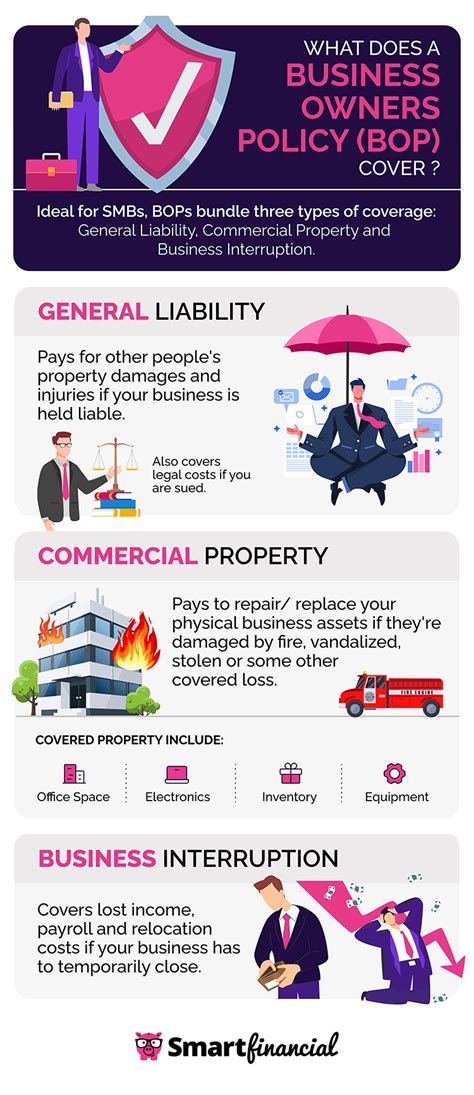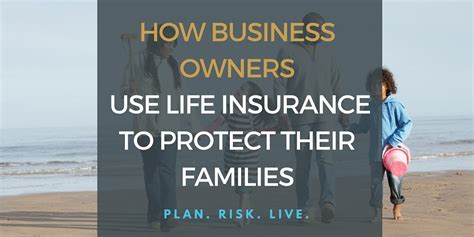Insurance For Business Owner

Every business owner knows that risks and uncertainties are an inherent part of running a business. From unexpected accidents to financial losses, these challenges can have a significant impact on the stability and growth of a company. This is where business insurance steps in as a crucial safeguard, offering protection and peace of mind to entrepreneurs.
In this comprehensive guide, we will delve into the world of insurance for business owners, exploring the various types, benefits, and considerations that come with it. By understanding the ins and outs of business insurance, you can make informed decisions to ensure the longevity and success of your enterprise.
Understanding the Need for Business Insurance

Business insurance is a vital tool for managing the unique risks that come with operating a company. It provides a safety net against financial losses arising from a range of events, including property damage, legal liabilities, and even loss of income. By having the right insurance coverage, business owners can protect their assets, maintain operations, and mitigate potential financial disasters.
The need for business insurance becomes even more evident when considering the diverse nature of risks in today's business landscape. From natural disasters like floods and earthquakes to cyber attacks and employee injuries, the potential hazards are numerous and varied. Without adequate insurance, a single unforeseen event could lead to devastating consequences, threatening the very existence of the business.
Types of Business Insurance

The insurance landscape for businesses is diverse, offering a range of policies tailored to specific needs. Here’s an overview of some of the most common types of business insurance:
General Liability Insurance
General liability insurance is a cornerstone of business protection, providing coverage for a broad range of claims, including bodily injury, property damage, and advertising injuries. This type of insurance is particularly important for businesses that interact with the public, as it can protect against slip-and-fall accidents, product liability claims, and other potential lawsuits.
For instance, imagine a scenario where a customer slips and falls in your retail store, sustaining injuries. With general liability insurance, you can have the peace of mind that the medical expenses and potential legal fees associated with such an incident are covered. This insurance not only safeguards your business financially but also helps maintain your reputation and customer trust.
Professional Liability Insurance (Errors and Omissions)
Professional liability insurance, also known as errors and omissions (E&O) insurance, is designed to protect businesses that provide professional services. It covers claims arising from negligent acts, errors, or omissions in the course of providing those services. This type of insurance is crucial for professionals such as consultants, accountants, lawyers, and engineers, who face the risk of being sued for mistakes in their work.
Consider a scenario where a software consulting firm provides an update to a client's system, but due to an oversight, the update causes a critical data breach. In such a case, professional liability insurance can step in to cover the costs associated with investigating the breach, notifying affected parties, and potentially compensating for any damages or losses incurred by the client.
Product Liability Insurance
Product liability insurance is essential for businesses that manufacture, distribute, or sell physical products. It protects against claims resulting from defective or harmful products, covering medical expenses, property damage, and legal fees. With product liability insurance, businesses can mitigate the financial risks associated with product recalls, injuries, or property damage caused by their products.
Take, for example, a toy manufacturing company that discovers a design flaw in one of its popular toys, leading to choking hazards for young children. Product liability insurance would step in to cover the costs associated with recalling the affected toys, as well as any potential lawsuits filed by parents or guardians of affected children.
Business Owners Policy (BOP)
A Business Owners Policy (BOP) is a cost-effective insurance solution that combines multiple coverages into a single policy. Typically, a BOP includes property insurance, general liability insurance, business interruption insurance, and crime insurance. It is tailored to the specific needs of small and medium-sized businesses, providing comprehensive protection against a wide range of risks.
For a small bakery, a BOP could be an ideal solution. It would cover the bakery's physical assets, such as the building and equipment, as well as provide liability protection in case a customer slips and falls while visiting the bakery. Additionally, it would offer coverage for business interruption, ensuring the bakery can continue operations and maintain its revenue stream in the event of a covered loss.
Workers’ Compensation Insurance
Workers’ compensation insurance is a legal requirement in many jurisdictions and is designed to protect both employers and employees in the event of workplace injuries or illnesses. It provides medical benefits, disability income, and death benefits to employees who suffer work-related injuries or illnesses. This insurance not only ensures the well-being of employees but also protects employers from potential lawsuits.
Consider a construction company with a large workforce. Workers' compensation insurance would provide coverage for employees who sustain injuries on the job site, such as a broken leg from a fall or respiratory issues from exposure to harmful substances. By having this insurance, the company can ensure its employees receive the necessary medical care and financial support while minimizing legal liabilities.
Benefits of Business Insurance
Business insurance offers a multitude of benefits that go beyond mere financial protection. Here are some key advantages of having comprehensive insurance coverage:
Financial Protection
Perhaps the most obvious benefit of business insurance is the financial protection it provides. By covering a wide range of potential losses, insurance policies ensure that businesses can weather unforeseen events without facing bankruptcy or severe financial strain. This financial safety net is especially crucial for small and medium-sized businesses that may not have the reserves to absorb significant losses.
Peace of Mind
Knowing that your business is adequately insured can bring immense peace of mind to business owners. It allows them to focus on their core operations, strategic planning, and growth initiatives without constantly worrying about potential risks and their financial implications. With insurance in place, entrepreneurs can approach their work with confidence, knowing they are prepared for the unexpected.
Risk Management
Business insurance plays a critical role in risk management. By identifying and mitigating potential risks, insurance providers can help businesses develop comprehensive risk management strategies. This includes implementing safety protocols, improving workplace conditions, and addressing potential hazards. Through risk management, businesses can reduce the likelihood of incidents and minimize their impact when they do occur.
Legal Compliance
Certain types of business insurance, such as workers’ compensation and professional liability insurance, are often mandated by law or industry regulations. By ensuring compliance with these requirements, businesses can avoid legal penalties and maintain their operational integrity. Additionally, having the necessary insurance coverage can enhance a business’s reputation and credibility, especially when dealing with clients or partners who prioritize ethical and legal practices.
Factors to Consider When Choosing Business Insurance
When selecting insurance coverage for your business, it’s essential to consider several key factors to ensure you choose the right policies. Here are some considerations to keep in mind:
Industry-Specific Risks
Different industries face unique risks and challenges. For instance, a technology startup may need cyber liability insurance to protect against data breaches, while a manufacturing company might prioritize product liability insurance. Understanding the specific risks associated with your industry is crucial for tailoring your insurance coverage accordingly.
Coverage Limits and Deductibles
When reviewing insurance policies, pay close attention to the coverage limits and deductibles. Coverage limits dictate the maximum amount an insurer will pay for a covered loss, while deductibles represent the portion of the loss that you, as the policyholder, are responsible for. It’s essential to strike a balance between affordable premiums and adequate coverage limits to ensure you’re sufficiently protected.
Policy Exclusions
Policy exclusions are events or circumstances that are not covered by the insurance policy. It’s crucial to carefully review the exclusions listed in each policy to ensure that your business’s specific risks are covered. If you have concerns about potential exclusions, consider discussing them with your insurance provider to find a policy that aligns with your needs.
Cost and Budget Considerations
Insurance premiums can vary significantly based on factors such as your business’s size, location, industry, and claims history. While it’s important to secure comprehensive coverage, you should also consider your budget and strive to find policies that offer the best value for your money. Shop around, compare quotes from different providers, and don’t hesitate to negotiate to find the most cost-effective solution for your business.
Reputation and Reliability of Insurance Providers
When choosing an insurance provider, it’s essential to research their reputation and reliability. Look for companies with a solid track record of paying claims promptly and fairly. Check customer reviews and ratings, and consider consulting with industry peers or business associations to gather recommendations and insights on reputable insurance providers.
Conclusion: Empowering Your Business with Insurance

Business insurance is not just a necessity; it’s a powerful tool that empowers business owners to navigate the unpredictable landscape of entrepreneurship with confidence. By understanding the various types of insurance, their benefits, and the factors to consider, you can make informed decisions to safeguard your business and its future.
As you embark on this journey of securing your business with insurance, remember that it's an ongoing process. Regularly review and update your insurance coverage to reflect the evolving needs and risks of your business. Stay informed, consult with experts, and leverage the power of insurance to protect your hard-earned assets and foster the growth and success of your enterprise.
What is the purpose of business insurance?
+Business insurance is designed to protect companies from financial losses arising from various risks, including property damage, legal liabilities, and loss of income. It provides a safety net, ensuring that businesses can continue operations and maintain their stability in the face of unforeseen events.
How much does business insurance cost?
+The cost of business insurance varies based on factors such as the size and location of the business, the industry, and the coverage limits chosen. It’s recommended to obtain quotes from multiple insurers to find the most cost-effective coverage for your specific needs.
Can business insurance be customized to my specific needs?
+Absolutely! Many insurance providers offer customizable policies that can be tailored to the unique needs of your business. Whether you require specialized coverage for specific risks or prefer a more comprehensive approach, insurers can work with you to create a policy that fits your requirements.
Is business insurance a legal requirement?
+While not all types of business insurance are legally mandated, certain policies, such as workers’ compensation insurance, are required by law in many jurisdictions. It’s crucial to understand the legal requirements in your area and ensure compliance to avoid penalties and legal issues.



